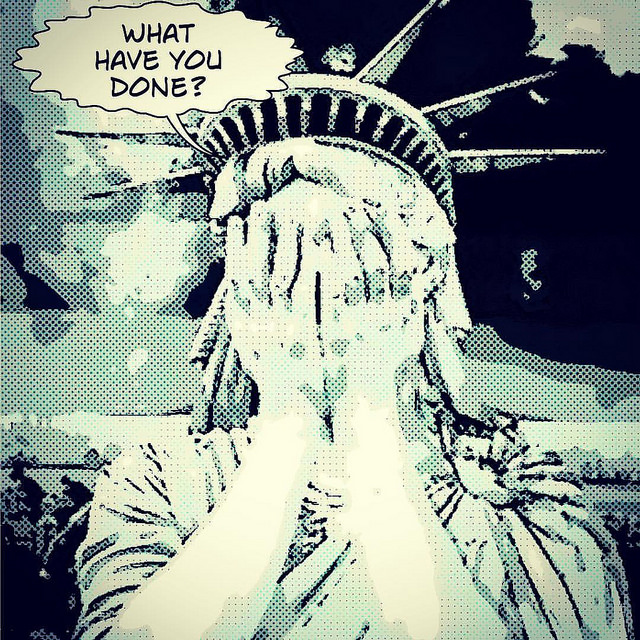Like this article? rabble is reader-supported journalism. Chip in to keep stories like these coming.
There’s this to be said for Trump v. Clinton, now upon us: it’s contributed a new political acronym, LEV, for Lesser Evil Voting. I think Noam Chomsky coined it, with collaborator John Halle. I can’t find other sources.
Chomsky has a puckish side. In the 1970s, writing on the “political economy of human rights,” he delineated mainstream types of terrorism: nefarious (done by the bad guys), constructive (by our side) and benign (irrelevant to Western interests, so who cares). LEV basically means voting for Clinton since she’s slightly less abominable than Trump. Chomsky, who leans toward anarchism, supports this.
Even before the coinage, it was subject to passionate denunciation in the U.S. The Des Moines Register warned: Don’t vote your fears by voting for the lesser of two evils. The left-wing site, Counterpunch, was more agitated: “Lesser of Two Evils Vote is Counterproductive and Morally Corrupt.”
So LEV hits a raw nerve, especially among progressives. Chomsky lays out eight points for it. The rebuttals — too mild a word — divide along two lines.
There’s the Not a Dime’s Worth of Difference argument, which shades into Hillary Might Even Be Worse. On, for instance, opposing trade deals, such as NAFTA or TPP, or not invading Muslim countries, Trump may have a better position than Hillary. In fact, he I think he does. But he immediately vitiates that by aiming to destroy unions, which was also a chief goal of those trade deals; and by his readiness to use or disperse nuclear weapons in the Mideast and elsewhere.
Chomsky also notes Trump denies climate change, would deport 11 million Mexicans, ban all Muslims, cut taxes on the rich, and encourages violence by supporters. Add in Trump’s impulsive, four-year-old’s personality (sorry, four-year-olds). Even so, Chomsky is cautious, saying the damage to the poor and marginalized under a president Trump has “a high probability of being significantly greater” than under Hillary. He’s not exactly burbling about her.
But the real juice in the anti-LEV position comes from a less rational, more visceral source: a sense of self-betrayal and guilt over voting for the lesser evil. Right is right and evil isn’t. Jeffrey St. Clair of Counterpunch says LEV voters think they’ll escape blame for “the deaths caused” by Hillary as president, although they voted for her.
Meanwhile “Greens, anarchists, socialists and anti-war libertarians who recoil” from her and either don’t vote, or vote for some worthy but hopeless candidate, face being guilted “for the carnage caused” by Trump, yet they didn’t even vote for him. This is weirdly fascinating.
It treats voting as a test of moral worth rather than a strategic exercise in making the best of a bad set of choices. When you get to Heaven, you’ll be able to say: I voted my conscience. You’d just better hope the gatekeeper doesn’t respond (invoking Madeleine Albright’s pro-Hillary argument): There’s a special place in Hell reserved for people who vote their conscience, down you go.
This is conscience in its meagrest sense, the Freudian superego at its crassest, like a mean old man sitting in your head, barking the equivalent of Get Off My Lawn: “Vote for what you know is right, never mind the consequences.”
Some anti-LEVers yearn for a third party to supplant the corrupt ones we now have and fear LEV will postpone its coming. That suggests a surprising faith in the current political system — what Chomsky calls our “weak form of democracy” — as if all that’s needed is another, better party. But third parties have shown themselves susceptible to corruption with impressive speed, where they’ve got off the ground. And, to my shock anyway, Sanders in the U.S. and Corbyn in the U.K. have proven you can mount fairly significant challenges within the decaying corpses of the old parties.
We had our own LEV experience last fall, with Stephen Harper in the Trump role and earnest voters agonizing over whether to back the lesser evil in Trudeau or Mulcair. I’ve met people who voted NDP in the morning, then went to another riding to canvass for a Liberal in the afternoon. It’s kind of inspirational.
A teenager I know who won’t get to vote till next election thinks it’s a matter of learning to treat parties as adverbs rather than nouns: you vote Liberal or NDP. See, it’s about how you vote, not what you are.
This column was first published in the Toronto Star.
Image: Andrew Comings/flickr
Like this article? rabble is reader-supported journalism. Chip in to keep stories like these coming.



